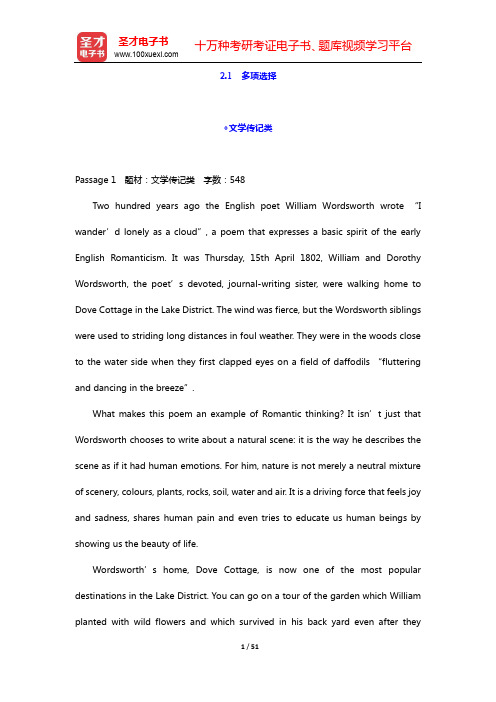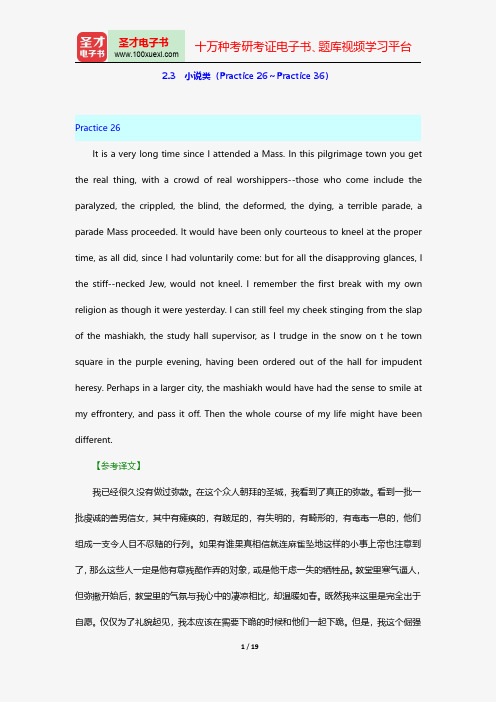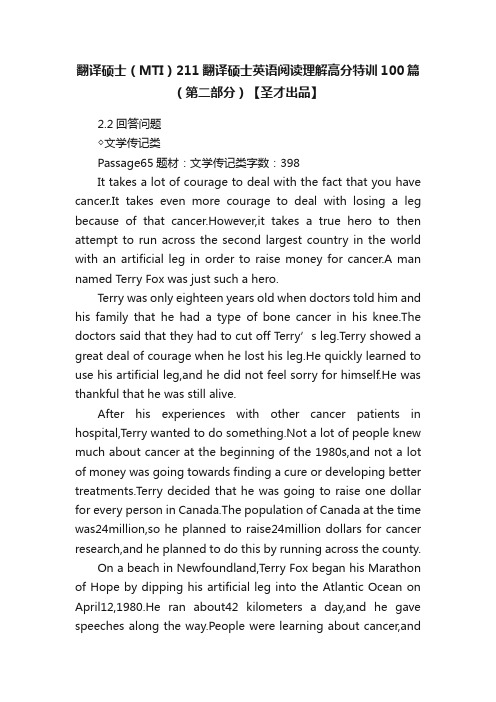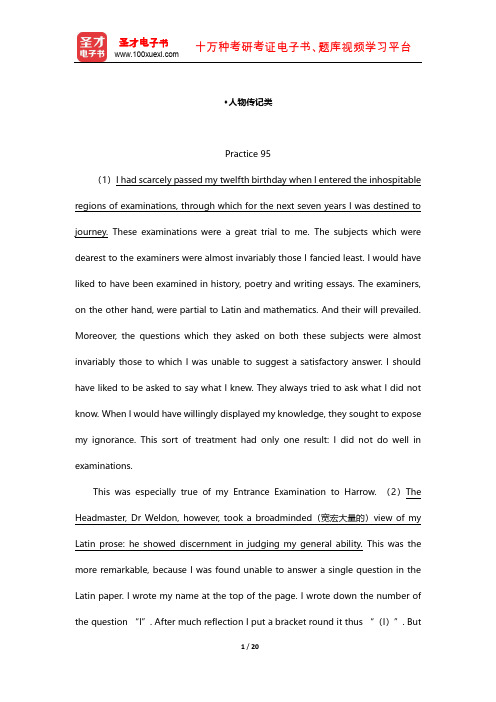考研英语(一)英汉翻译高分特训100篇-第一章至第二章【圣才出品】
翻译硕士(MTI)211翻译硕士英语阅读理解高分特训100篇-多项选择-◇文学传记类【圣才出品】

2.1 多项选择◇文学传记类Passage 1 题材:文学传记类字数:548Two hundred years ago the English poet William Wordsworth wrote “I wander’d lonely as a cloud”, a poem that expresses a basic spirit of the early English Romanticism. It was Thursday, 15th April 1802, William and Dorothy Wordsworth, the poet’s devoted, journal-writing sister, were walking home to Dove Cottage in the Lake District. The wind was fierce, but the Wordsworth siblings were used to striding long distances in foul weather. They were in the woods close to the water side when they first clapped eyes on a field of daffodils “fluttering and dancing in the bre eze”.What makes this poem an example of Romantic thinking? It isn’t just that Wordsworth chooses to write about a natural scene: it is the way he describes the scene as if it had human emotions. For him, nature is not merely a neutral mixture of scenery, colours, plants, rocks, soil, water and air. It is a driving force that feels joy and sadness, shares human pain and even tries to educate us human beings by showing us the beauty of life.Wordsworth’s home, Dove Cottage, is now one of the most popular destinations in the Lake District. You can go on a tour of the garden which William planted with wild flowers and which survived in his back yard even after theydisappeared from the area. “He always said that if he hadn’t been a poet, he would have been a te rrific landscape gardener,” says Allan King of the Wordsworth Trust, the organization that looks after the cottage and gardens.The Lake District in the north west of England becomes particularly crowded during the summer months with tourists and ramblers eager to enjoy the region’s majestic valleys, hills and sparkling lakes. Wordsworth himself was far from keen on tourists, which was quite apparent. He wanted outsiders to admire the local sights he enjoyed so much, but was afraid the district might be “damaged” by too many visitors. He opposed the coming of the trains, and campaigned in the 1840s against a plan to link the towns in the area—Kendal, Windermere and Keswick—by rail.The place near Ullswater, where Wordsworth saw the daffodils, is at the southernmost end of the lake. The lake is wide and calm at this turning point. There’s a bay where the trees have had their soil eroded by lake water so that their roots are shockingly exposed. You walk along from tree to tree, hardly daring to breathe, because you are walking in the footprints of William and Dorothy from two centuries ago. The first clumps of daffodils appear, but they aren’t tall yellow trumpets proudly swaying in the breeze. They’re tiny wild daffodils, most of them still green and unopened, in clumps of six or seven. They’re grouped around individual trees rather than collecting together.But as you look north, from beside a huge ancient oak, you realize this is what delighted the Wordsworths: clump after clump of the things, spread out to left and right but coming together in your vision so that they form a beautiful, pale-yellowcarpet. What you’re seeing at last is nature transformed by human sight and imagination. For a second, you share that revelation of Dorothy and William Wordsworth’s,the glimpse of pantheism, the central mystery of English Romanticism.1. According to the article, Wordsworth’s poem ______.[A] started the Romantic movement[B] was based on actual experience[C] was written while he was visiting his sister[D] was written after he had been lonely2. What was Wordsworth’s attitude to nature?[A] He believed nature had a character of its own.[B] He felt nature was human.[C] He thought nature could talk to people.[D] He believed that we could influence nature.3. We are told that Dove Cottage ______.[A] has gardens designed by a landscape gardener[B] has very old plants in the garden[C] gets a lot of visitors[D] has a large back yard4. What does the writer suggest by the words “hardly daring to breathe” in line 4, paragraph 5?[A] You have to walk carefully here.[B] You can’t breathe because the atmosphere is suffocating.[C] You might feel excited to be in this place.[D] You must concentrate to stay on the footpath.5. What does the writer think of Wordsworth as a poet?[A] He believes that Wordsworth was an important figure in English culture.[B] He is critical of Wordsworth.[C] He believes Wordsworth was a sentimental person.[D] He disagrees with Wordsworth’s opinion about nature.【答案与解析】1. B 根据第一段大意,可知Wordsworth的诗是根据他和姐妹步行回家所看到的风景写成的。
英语专业考研英汉翻译高分特训100篇小说类【圣才出品】

2.3小说类(Practice26~Practice36)Practice26It is a very long time since I attended a Mass.In this pilgrimage town you get the real thing,with a crowd of real worshippers--those who come include the paralyzed,the crippled,the blind,the deformed,the dying,a terrible parade,a parade Mass proceeded.It would have been only courteous to kneel at the proper time,as all did,since I had voluntarily come:but for all the disapproving glances,I the stiff--necked Jew,would not kneel.I remember the first break with my own religion as though it were yesterday.I can still feel my cheek stinging from the slap of the mashiakh,the study hall supervisor,as I trudge in the snow on t he town square in the purple evening,having been ordered out of the hall for impudent heresy.Perhaps in a larger city,the mashiakh would have had the sense to smile at my effrontery,and pass it off.Then the whole course of my life might have been different.【参考译文】我已经很久没有做过弥散。
英语专业考研基础英语翻译高分特训100篇(汉译英高分特训50篇)经济类【圣才出品】

◆经济类Practice 57我多次参加过亚太经合组织工商领导人峰会,与亚太地区工商界人士共商促进本地区的经济合作与发展问题。
这次上海亚太经合组织共商领导人峰会以“新世纪、新经济:在全球化中发展”为题进行专门讨论,很有意义。
在上次文莱亚太经合组织工商领导人峰会上,我就新经济和经济全球化问题谈了看法。
今天,我想进一步谈谈对这个问题的看法。
人类进入新世纪,不仅意味着年代上的更新,而且意味着国际社会开启了经济发展和社会进步的新时期。
主要标志是:世界多极化、经济全球化的不断发展,尤其是科学技术的突飞猛进,为全球经济和社会发展提供了前所未有的物质技术条件,打开了广阔的前景。
日新月异的科技进步,正在深刻地影响着人们的经济、政治和文化生活。
推动新经济的发展,不仅要求我们用先进科学技术更新经济,而且要求我们适应这个发展趋势来更新经济结构、经济体制、经济机制,更新国与国、企业与企业之间的经济关系,更新推进各国开展经济技术合作的指导思想和观念。
100多年来,世界生产力迅速发展,物质财富和精神财富的生产都取得了空前的成就,人类生活状况得到了很大的改善。
但也必须看到,在生产力和科学技术迅速发展的同时,世界发展不平衡的现象始终存在,尤其是南北差距不仅没有缩小,反而不断扩大;广大发展中国家仍比较普遍地存在贫穷和饥饿现象;地区冲突、环境恶化、国际犯罪等问题仍然困扰着人们;高新技术产业的发展也面临着一些问题,特别是有效需求相对不足的问题。
这说明,要使得各国人民都能享受生产力特别是科技进步的成果,实现普遍发展,必须在发展新科技、新产业的同时,对经济结构、经济体制、经济机制进行改革和更新。
关键是要在世界经济事务中全面贯彻多边主义的合作发展精神。
不同民族、不同历史文化、不同社会制度和不同经济发展水平的国家和地区,应互相尊重,求同存异,取长补短,和平共处,协商合作,推动建立公正合理的国际政治经济新秩序,努力促进共同发展和繁荣。
这是解决目前世界经济发展中存在问题的根本出路,也是推动新经济进一步发展的必要条件。
翻译硕士(MTI)211翻译硕士英语阅读理解高分特训100篇(第二部分)【圣才出品】

翻译硕士(MTI)211翻译硕士英语阅读理解高分特训100篇(第二部分)【圣才出品】2.2回答问题◇文学传记类Passage65题材:文学传记类字数:398It takes a lot of courage to deal with the fact that you have cancer.It takes even more courage to deal with losing a leg because of that cancer.However,it takes a true hero to then attempt to run across the second largest country in the world with an artificial leg in order to raise money for cancer.A man named Terry Fox was just such a hero.Terry was only eighteen years old when doctors told him and his family that he had a type of bone cancer in his knee.The doctors said that they had to cut off Terry’s leg.Terry showed a great deal of courage when he lost his leg.He quickly learned to use his artificial leg,and he did not feel sorry for himself.He was thankful that he was still alive.After his experiences with other cancer patients in hospital,Terry wanted to do something.Not a lot of people knew much about cancer at the beginning of the 1980s,and not a lot of money was going towards finding a cure or developing better treatments.Terry decided that he was going to raise one dollar for every person in Canada.The population of Canada at the time was24million,so he planned to raise24million dollars for cancer research,and he planned to do this by running across the county.On a beach in Newfoundland,Terry Fox began his Marathon of Hope by dipping his artificial leg into the Atlantic Ocean on April12,1980.He ran about42 kilometers a day,and he gave speeches along the way.People were learning about cancer,andthey were giving money to Terry and his dream.T erry kept running.He ran through Quebec to Ontario.By August,he was halfway across Canada.In the middle of the Marathon of Hope,however,Terry’s chest started to hurt. He stopped running and saw a doctor.Unfortunately,the cancer had returned and was now in his lungs.He had to give up the Marathon of Hope and go back into hospital.Sadly,Terry Fox passed away in1981without finishing his run,but not before24million dollars had been raised for cancer research.Money has continued to be raised in his name since that time.More than360million dollars has been raised worldwide in yearly Terry Fox Runs.Questions1to5Answer the following questions with the information given in the passage in a maximum of10words for each question.1.What happened to Terry Fox when he was18?2.Why did Terry want to run across Canada?3.Where did Terry come up with the number24million?4.What was the most amazing thing about T erry’s Marathon of Hope?5.Why did Terry have to stop running?【答案与解析】1.He lost a leg because of cancer.(第二段第二、三句指出”医生说要切除Terry的腿,Terry失去腿后显示出极大的勇气”。
考研英语(一)英汉翻译高分特训(人物传记类)【圣才出品】

◆人物传记类Practice 95(1)I had scarcely passed my twelfth birthday when I entered the inhospitable regions of examinations, through which for the next seven years I was destined to journey. These examinations were a great trial to me. The subjects which were dearest to the examiners were almost invariably those I fancied least. I would have liked to have been examined in history, poetry and writing essays. The examiners, on the other hand, were partial to Latin and mathematics. And their will prevailed. Moreover, the questions which they asked on both these subjects were almost invariably those to which I was unable to suggest a satisfactory answer. I should have liked to be asked to say what I knew. They always tried to ask what I did not know. When I would have willingly displayed my knowledge, they sought to expose my ignorance. This sort of treatment had only one result: I did not do well in examinations.This was especially true of my Entrance Examination to Harrow. (2)The Headmaster, Dr Weldon, however, took a broadminded(宽宏大量的)view of my Latin prose: he showed discernment in judging my general ability. This was the more remarkable, because I was found unable to answer a single question in the Latin paper. I wrote my name at the top of the page. I wrote down the number of the qu estion “I”. After much reflection I put a bracket round it thus “(I)”. Butthereafter I could not think of anything connected with it that was either relevant or true. Incidentally there arrived from nowhere in particular a blot and several smudges (污迹). I gazed for two whole hours at this sad spectacle and then merciful ushers collected my piece of foolscap with all the others and carried it up to the Headmaster’s table. (3)It was from these slender indications of scholarship that Dr. Weldon drew the conclusion that I was worthy to pass into Harrow. It is very much to his credit. It showed that he was a man capable of looking beneath the surface of things: a man not dependent upon paper manifestations. I have always had the greatest regard for him.In consequence of his decision, I was in due course placed in the third, or lowest, division of the Fourth, or bottom, Form. (4)The names of the new boys were printed in the School List in alphabetical order; and as my correct name, Spencer-Churchill, began with an “S”, I gained no more advantage from the alphabet than from the wider sphere of letters. I was in fact only two from the bottom of the whole school; and these two; I regret to say, disappeared almost immediately through illness or some other cause.The Harrow custom of calling the roll is different from that of Eton. At Eton the boys stand in a cluster and lift their hats when their names are called. At Harrow they file(排成纵列行进)past a Master in the school yard and answer one by one. My position was therefore revealed in its somewhat invidious humility. (5)It was the year 1887, Lord Randolph Churchill had only just resigned his position as Leader of the House of Commons and Chancellor of the Exchequer(财政大臣),and he stilltowered in the forefront of politics. In sequence, large numbers of visitors of both sexes used to wait on the school steps, in order to see me march by; and I frequently heard the irreverent(无礼的)comment, “Why, he’s last of all!”【解析及译文】(1)【解析】本句中包含了“scarcely...when”的结构,表示“才…就”。
张培基《英汉翻译教程》学习辅导书( 我国翻译史简 介)【圣才出品】

第1章我国翻译史简介1.1 复习笔记一、我国翻译的早期我国的翻译事业有约两千年的历史。
最早开始的是佛经的翻译,翻译家有安世高、号称“三支”的支娄迦谶、支亮、支谦,竺法护。
二、隋唐时期我国翻译事业高度发达的时期是从隋代(公元五九〇年)起到唐代。
这一时期古代翻译界的巨星玄奘(与上述鸠摩罗什、真谛一起号称我国佛教三大翻译家)。
玄奘的贡献为:①玄奘不但把佛经由梵文译成汉文,而且把老子著作的一部分译成梵文,成为第一个把汉字著作向国外介绍的中国人。
②玄奘在翻译理论方面也是有贡献的,他提出的翻译标准是“既须求真,又须喻俗”,意即“忠实、通顺”。
三、明清时期从明代万历年间到清代“新学”时期,出现了以徐光启、林纾(琴南)、严复(又陵)等为代表的介绍西欧各国科学、文学、哲学的翻译家。
明徐光启和意大利人利玛窦合作,翻译了欧几里得的《几何原本》《测量法义》等书。
清林纾最著名的文学作品有《巴黎茶花女遗事》(La Dame aux Camelias)、《黑奴吁天录》(Uncle Tom’s Cabin)、《块肉余生述》(David Copperfield)、《王子复仇记》(Ham1et)等。
严复是我国清末新兴资产阶级的启蒙思想家,所译作品多系西方政治经济学说,如赫胥黎(T. H. Huxley)的《天演论》(Evolution and Ethics and Other Essays)、亚当·斯密(A. Smith)的《原富》(An Inquiry into the Nature and Causes of the Wealth of Nations)等。
严复提出了著名的“信、达、雅”翻译标准。
四、五四时期至今“五四”是我国近代翻译史的分水岭。
“五四”以后,我国翻译开始介绍马列主义经典著作和无产阶级文学作品。
《共产党宣言》的译文就发表在“五四”时期。
这一时期的翻译工作在内容和形式上都起了很大变化。
白话文代替了文言文。
考研英语(一)英汉翻译高分特训100篇【命题分析+答题攻略+强化训练】(人物传记类)【圣才出品】

◆人物传记类Practice95(1)I had scarcely passed my twelfth birthday when I entered the inhospitable regions of examinations,through which for the next seven years I was destined to journey.These examinations were a great trial to me.The subjects which were dearest to the examiners were almost invariably those I fancied least.I would have liked to have been examined in history,poetry and writing essays.The examiners, on the other hand,were partial to Latin and mathematics.And their will prevailed. Moreover,the questions which they asked on both these subjects were almost invariably those to which I was unable to suggest a satisfactory answer.I should have liked to be asked to say what I knew.They always tried to ask what I did not know.When I would have willingly displayed my knowledge,they sought to expose my ignorance.This sort of treatment had only one result:I did not do well in examinations.This was especially true of my Entrance Examination to Harrow.(2)The Headmaster,Dr Weldon,however,took a broadminded(宽宏大量的)view of my Latin prose:he showed discernment in judging my general ability.This was the more remarkable,because I was found unable to answer a single question in the Latin paper.I wrote my name at the top of the page.I wrote down the number of the question“I”.After much reflection I put a bracket round it thus“(I)”.But thereafter I could not think of anything connected with it that was either relevant ortrue.Incidentally there arrived from nowhere in particular a blot and several smudges(污迹).I gazed for two whole hours at this sad spectacle and then merciful ushers collected my piece of foolscap with all the others and carried it up to the Headmaster’s table.(3)It was from these slender indications of scholarship that Dr.Weldon drew the conclusion that I was worthy to pass into Harrow.It is very much to his credit.It showed that he was a man capable of looking beneath the surface of things:a man not dependent upon paper manifestations.I have always had the greatest regard for him.In consequence of his decision,I was in due course placed in the third,or lowest,division of the Fourth,or bottom,Form.(4)The names of the new boys were printed in the School List in alphabetical order;and as my correct name, Spencer-Churchill,began with an“S”,I gained no more advantage from the alphabet than from the wider sphere of letters.I was in fact only two from the bottom of the whole school;and these two;I regret to say,disappeared almost immediately through illness or some other cause.The Harrow custom of calling the roll is different from that of Eton.At Eton the boys stand in a cluster and lift their hats when their names are called.At Harrow they file(排成纵列行进)past a Master in the school yard and answer one by one.My position was therefore revealed in its somewhat invidious humility.(5)It was the year1887,Lord Randolph Churchill had only just resigned his position as Leader of the House of Commons and Chancellor of the Exchequer(财政大臣),and he still towered in the forefront of politics.In sequence,large numbers of visitors of bothsexes used to wait on the school steps,in order to see me march by;and I frequently heard the irreverent(无礼的)comment,“Why,he’s last of all!”【解析及译文】(1)【解析】本句中包含了“scarcely...when”的结构,表示“才…就”。
英语专业考研基础英语翻译高分特训100篇(翻译技巧指南)英译汉翻译技巧指南【圣才出品】

1.3 英译汉翻译技巧指南尤金·奈达将翻译的原则和标准概括为:“翻译就是在译语中用最为贴切自然的对等语,首先在语义上,其次在风格上再现原语的信息”。
英译汉的过程可分为理解和表达两个阶段。
要真正掌握英译汉的技巧并非易事。
首先是英文理解难,由于两国历史、文化、风俗习惯的不同,所以一句英文在英美人看来顺理成章,而在中国人看来却极为别扭。
二是中文表达难,英译汉有时很难找到一个合适的对等词汇。
另外,英译汉时对掌握各种文化知识的要求很高,因为我们所翻译的文章,其内容可能涉及到极为广博的知识领域,而这些知识领域多半是我们不大熟悉的外国的事情,如果不具备相应的文化知识难免会出现一些翻译中的差错或笑话。
正是因为英译汉时会遇到这么多的困难,所以,我们必须通过翻译实践,对英汉两种不同语言的特点加以对比、概括和总结,以找出一般的表达规律来,避免出现一些不该出现的翻译错误,而这些表达的规律就是我们所说的翻译技巧。
本部分内容分别从词、句、篇章三个层次介绍英译汉方面的相关技巧。
一、词的翻译翻译离不开词,而英语和汉语在词的构成,意义,词性,词序等方面都有很大的不同。
正因为英汉词汇之间有很多差异,因此词汇翻译不可能达到一一对应的程度,以一个汉语词套用一个英语词,而是要掌握一定的词汇翻译技巧。
本书总结出在英译汉的过程中几大主要关于词的翻译技巧:语义确定、词类转化法、增减法、反译法、分译法、释义法。
(一) 语义确定在进行英译汉时,同样一个简单的字或词语,在不同的上下文中,就可能含有不同的意义。
这就需要译者依靠具体的上下文来判断某一个字或词语的意义。
词义的确定一般要经过两个必不可少的步骤:一是正确理解;二是确切表达。
1. 理解中的选义在英语词汇里,有些词语义丰富,释义繁多,给词义的确定带来不便。
除此以外,还有不少词语搭配中的虚实两用,也就是一个词的原义,或者是实义,以及它的引申义,或者是虚义一起使用。
这都给翻译工作带来很大难度。
- 1、下载文档前请自行甄别文档内容的完整性,平台不提供额外的编辑、内容补充、找答案等附加服务。
- 2、"仅部分预览"的文档,不可在线预览部分如存在完整性等问题,可反馈申请退款(可完整预览的文档不适用该条件!)。
- 3、如文档侵犯您的权益,请联系客服反馈,我们会尽快为您处理(人工客服工作时间:9:00-18:30)。
第1章考研英语(一)翻译攻略
1.1考研英语(一)翻译题型介绍
一、综述
考研英语(一)阅读C节,即英译汉部分要求考生阅读一篇约为400词的英语文章,文章中有5个画线部分,约150词,要求考生在30分钟内将其译为汉语,并要求译文准确、完整、通顺。
根据大纲规定,考研英语(一)的评分标准如下:
1.五个小题,每题两分,共10分。
2.如果句子译文扭曲原文意思,该句得分最多不得超过0.5分。
3.如果某考生给出两种或两种以上的译法,若均正确,给分;若其中一种译法错误,不给分。
4.汉语错别字,不个别扣分,按整篇累计扣分。
在不影响意思的前提下,满三个错别字扣0.5分。
二、命题特点
(1)选文特点
①体裁多样,以议论文和说明文为主。
②题材广泛,英译汉所选用的文章大多摘自原版刊物或读物,内容涉及社会生活、科普知识、文化教育、人物传记等几个方面。
下表是历年真题选文具体信息:
(2)设题特点
通过对近年来试题的分析研究中,我们发现,英译汉部分的命题有以下几个明显的趋势:
①从语法来看
近年来难度有所降低,长句、难句逐步变少。
适当降低英译汉文章的难度,以便要求考生在对文章深层次理解的同时,掌握并运用最基本的翻译技巧。
②从词汇来看
一词多义,一词转义现象增多。
要求考生必须根据上下文灵活地选择词义或将词义加以引申。
从这一点讲,词汇难度有增加的趋势。
如考题中的代词,如this、that、it、they等
情况复杂,往往不是单纯地指代一个简单的名词,而是指代上下文的一件事或一个观点等,考生需要根据上下文准确把握其中的意思。
尤其是当一个代词指代的是后面的内容时,较难把握,更需要考生仔细阅读上下文了。
③从翻译技巧来看
越来越重视考生掌握和运用基本翻译技巧的能力,并要求考生具有相当的中文水平。
基本的翻译技巧训练是迅速提高本部分得分的有效途径。
1.2英语与汉语的差异
英语和汉语是有着很大差异的。
首先对这些差异有一个总体印象,在做题时就能得心应手。
差异主要表现在:
1.形合与意合
英语重形合,而汉语重意合。
也就是说,英语注重使用很多连词,而在汉语中,句与句之间使用连词的情况不如英语普遍。
如“早知今日,何必当初?”英语表述为“If I had known it would come to this,I would have acted differently.”
2.具体与抽象
英语中多用具体的词语,少用一些抽象的概念,而汉语中使用抽象的概念较多。
如“吃一堑,长一智”的英文表述是“A fall in the pit,a gain in the wit.”
3.汉语与英语的词序与语序,结构都存在很大差异
英语多用被动语态,汉语多用主动语态。
在英译汉时,最好变英语中的被动表达方式为汉语表达中的主动形式,这样才符合汉语的语言习惯。
4.简洁最美
翻译时尽可能用简短的语言,省略不必要的词语和词组。
切忌累赘。
有时一句话,汉语中的表达很简洁,而英语的相应表达形式很繁琐,有时则相反。
1.3考研英语(一)翻译的基本方法和技巧
翻译首先要正确理解原文。
然后创造性的用中文把它表述出来。
因此,英译汉的过程包括理解,分析句架表达和校核三个阶段,理解是表达的前提,若不能正确地理解原文就谈不上确切的表达,但理解与表达通常是互相联系,往返反复的过程,在进行汉语表达的时候,又可以进一步加深对原文的理解,因此,在英译汉的过程中,往往需要考生从英语到汉语,再从汉语到英语反复的推敲。
一、理解
联系上下文进行理解。
联系一个句子,一个段落,一章,整篇文章来准确理解作者的思路和意图。
理解时,一些文化背景知识必不可少。
另外,原文中的一个词,一个词组或某个句子可能会有几种不同的意思,针对这种情况,要仔细推敲,分析来龙去脉,估计实际情况,根据逻辑推理来决定哪一种译法能准确反映作者的意图和思想。
理解阶段的目的在于读懂英语原文,弄清原文的意思。
为了透彻理解原文,建议考生在复习和应试时采取下列步骤:1.通读全文
通读全文的目的在于从整体上把握整篇文章的内容,需要理解划线的部分与文章其他部分之间的语法与逻辑关系。
在段落中要搞清划线的句子和其他句子之间的关系,特别要弄清代词it,they,them,this,that,these,those,other所指代的词或词组。
这些词和词组有时在划线的部分就能找到,有时则要到前面有关的句子中去找。
比如“It is not that scales in
the one case,and the balance in the other,differ in the principles of their construction or manner of working;but that the latter is a much finer apparatus and of course much more accurate in its measurement than the former.”在这个句子中,the scales in the one case,the balance in the other,the former,the latter等的含义都是在把握全文的基础之上才能掌握的,也只有这样我们才能做出正确的翻译。
目前市场上的一些复习指导书主张考生不用通读全文,这是很不可取的,因为孤立地阅读每个句子,往往无法理解其真正含义。
一篇好的文章,其前后的意思都互相关联,具有很强的逻辑性,一个单词或句子只有在具体的上下文中才能体现出确切的含义来,这就是为什么我们有时看完一本书或一篇文章之后才对上文中的某个难以理解的地方“恍然大悟”。
因此,上下文能帮助我们正确的理解每个句子,通读全文是很重要的。
通读全文的过程中应该注意,对非划线的部分不要花费时间过多,对于其中一些不太容易理解的内容也不必太在意,只是搞清大体意义即可。
因为通读全文的目的在于帮助自己理解划线的部分,只要能把该部分理解透彻也就足够了。
2.分析句子结构
中国的英语学习者往往具有非常好的英语语法知识,在做翻译试题时也应充分发挥和利用这一优势。
从近年来的考研英语(一)真题来看,划线的部分一般来说结构句子都比较复杂。
如果不搞清楚句子的语法结构,很难达到正确完整地理解原文的要求。
在分析划线的部分的句子结构时,我们要注意首先把句子的主语、谓语和宾语找出来,这样句子的骨干结构也就清楚了,在分析句子的骨干结构时还应该注意分析句子中成分是否有省略的地方,主句和从句之间的关系是否明确等等。
在此我们再次提醒考生注意,正确地把握句子的结构是进行正确地翻译的关键,如果连句子结构还没有搞清楚,就匆忙地动笔翻译,肯定是不会有好的结果的,在往届的考生中,这样的教训屡见不鲜。
例:This trend began during the Second World War,when several governments came to the conclusion that the specific demands that a government wants to make of its scientific establishment cannot generally be foreseen in detail.
这是一个简单句,句子的骨干结构为This trend began during the Second World War,when...,when是一个关系副词,在这个句子中引导了一个非限制性定语从句,修饰前面的名词the Second World War。
而在when引导的定语从句中,主句是several governments came to the conclusion...,that引导了一个同位语从句,做conclusion的同位语。
在这个同位语从句中,主句是the specific demands...cannot generally be foreseen…,其中关系代词that引导了一个定语从句,修饰前面的名词demands。
这样通过我们进行详细的分析,在搞清楚句子的具体结构之后,再动笔翻译也就简单多了。
也只有划清句架结构,我们才能知道如何翻译。
例如:上句中如果我们把when作为状语从句,译成“当…时候”就要被扣分。
如果把demand当成动词,也要扣分。
3.理解分析句子的含义
考生不仅要弄清句子中所有实词和虚词的词汇意义,还要理解全句的整体意义。
理解句子的依据除了句子本身之外,还有该句子所处的具体的语言环境。
在此阶段应清楚下列问题:A.句子中是否含有代词和其他具有指代意义的词。
如果有,应根据上下文确定它们指代的内容是什么。
B.句子中的短语和一些常用的词往往具有多种含义和用法,那么,在该句中它们的具体含义是什么。
C.按照你的理解,该部分的意义是否与全篇文章的内容一致,有无相互矛盾。
总之,在动手翻译之前,首先要读懂原文,不要一上来就急于动手翻译,这样做往往会出现一种情况:该题快要翻译完了,猛然又发现自己理解有误马上就急忙修改,搞的卷面上一塌糊涂,。
